|
1.
CENTRAL/ WEST AFRICA
Demand for West African logs holds steady
No prices changes were reported in the first weeks of the
month. Log producers in Gabon were settling into the
newly implemented log quota system and demand for logs
remained steady throughout the region.
Lumber prices also are unchanged and firm, with demand
from European and Asian buyers at normal levels.
Exporters are following closely the various EU initiatives
with major importing countries on methods for preventing
imports of illegally sourced tropical timber, including
negotiations on Voluntary Partnership Agreements. There
are also frequent calls from the media and various timber
associations to continue attempts to harmonize the
acceptance of certification procedures of various
organizations so that governments and other purchasing
bodies are able to equally recognize the different schemes.
The current situation makes it difficult for buyers to
understand whether the timber offered by one seller
certified by a particular organization would be as
sustainably and legally sourced than that of another. Any
harmonized framework has to take into account the
regulatory requirements of the exporting countries, adding
complexities to such processes.
FSC reinstates certificate for Wijma Douala
TTJ reported that Wijma, a Cameroon subsidiary of
Koninklijke Houthandel G Wijma & Zonen BV in the
Netherlands, has had its Forest Stewardship Council (FSC)
certificate reinstated. The Cameroon-based company had
its certificate suspended after failing to meet several forest
management standards. However, Wijma has improved its
management protocols and procedures and strengthened
its forest management standards in Cameroon. The
company will continue to monitor its operations through a
newly developed monitoring programme.
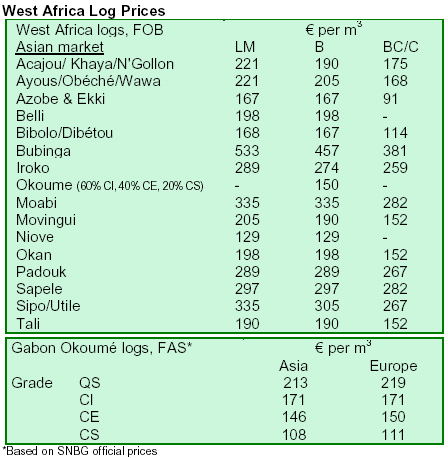
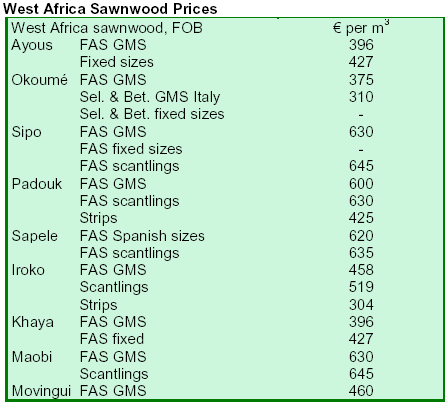
2. GHANA
Ghana announces new project on best practices
The Daily Graphic reported that Prof. Nii Ashie Kotey,
Chief Executive of the Forestry Commission (FC), has
announced a multilateral project to set best practices for
natural resource and environmental protection. The
project, which will start under the leadership of the World
Bank, will also involve development partners from the
UK, EU, the Netherlands, Denmark, Canada and France.
The project aims to promote forest management,
protection of forest resources from bush fires, plantation
establishment and natural regeneration, amount other
objectives.
Prof. Kotey said the FC would use internally generated
funds to support education and methods to prevent wild
fires, indicating that approximately GHc10 million would
be generated this year to support the project. The
representative for German technical cooperation, Ms.
Marita Brommelmeier, announced that EUR13 million had
been allocated to the project by the German government.
She called for the sustainability of the project to ensure
consistent dissemination of lessons learned, adding that
such lessons from the project may help alleviate poverty in
the future.
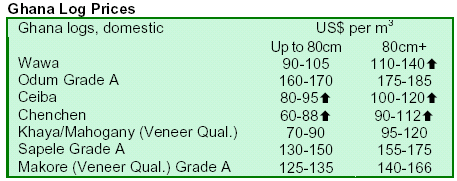
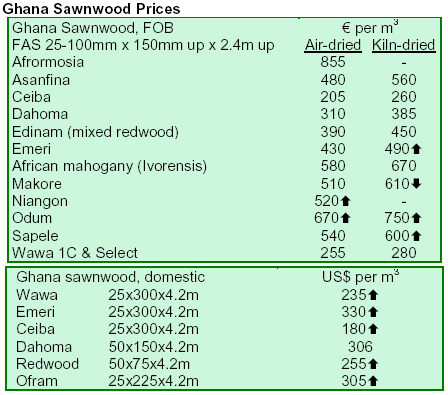
3.
MALAYSIA
MIFF 2008 to generate sales of USD667 million
According to Datuk Tan Chin Huat, Chairman of the
Malaysia International Furniture Fair 2008 (MIFF 2008),
the event is expected to bring in sales of USD667 million,
matching the level of sales from MIFF 2007. Chairman
Tan said he was optimistic the event would attract more
international buyers, especially from Western countries.
Tan also noted that household furniture had contributed
over 80% of the country¡¯s total furniture exports, while
office furniture and sofas accounted for 7% and 5%,
respectively. He further anticipated that the contribution of
office furniture to the economy would grow 10% in the
next two years.
Prices hold as buyers plan next move
Prices of Malaysian timber products held steady over the
last two weeks. While the construction industry in Japan
was far from recovering, plywood manufacturers were not
prepared to ease prices further. Rising fuel costs had
caused many manufacturers to resist cutting prices.
Moreover, some manufacturers were expecting demand to
pick up as several reconstruction projects will be launched
in China to fix damage caused by recent winter storms.
Rubberwood prices rose due to heavy rains that limited
supply. Additionally, the soaring price of crude oil has
caused prices of hydro-carbon material to increase and
sent competing materials such as rubber up as well. Log
prices in Sarawak are likely to rise in the next few weeks
as the state has been hit by a spell of bad weather.
Weak US dollar will not harm Malaysia furniture exports
The Star has reported on recent remarks by MIFF 2008
Chairman Tan (see article above), who indicated furniture
exports were likely to maintain current levels and would
command higher prices. Tan noted that the furniture
industry was ¡®diversifying¡¯, saying that companies were
designing products specifically for buyers of their choice.
These companies, referred to as Original Design
Manufacturers (ODM), were hoping to offset the dollar¡¯s
weakening to some extent by allowing the exporter or
manufacturer to determine selling prices. At the opening
of the MIFF 2008, the Deputy Minister of International
Trade and Industry, Ng Lip Yong, echoed Tan¡¯s positive
outlook and expected furniture exports would reach RM10
billion by 2010.
APP Timber reports 15% increase in sales volume
In a press release issued by APP Timber¡¯s Headquarters in
Malaysia, the company announced that sales in 2007 had
increased 15% in volume compared to 2006. However, it
was noted that the company increased its sales value only
by USD1 million, due to weakening markets for Asian
products and sourcing from lower quality raw materials.
The company noted the upswing in demand from the
flooring industry and stable demand from the door
industry, despite fierce competition for low-priced
products from China. Michael Hermens, managing
director of APP Timber, indicated that 2008 would be a
difficult year but the company was prepared to meet the
challenges in the year ahead. He also said the company
planned to add new warehousing facilities in Indonesia
and Thailand.
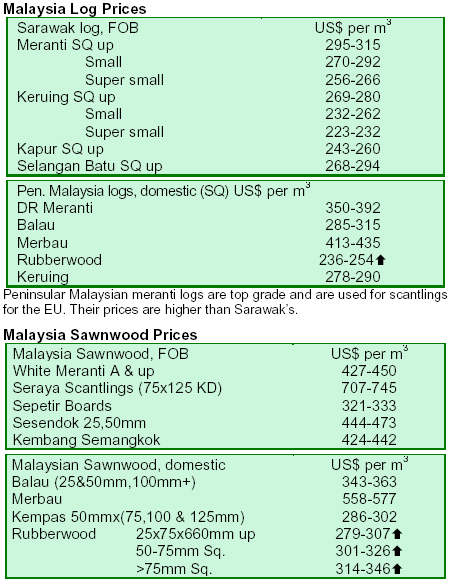
4.
INDONESIA
Indonesia upbeat on export outlook despite market conditions
The Jakarta Post reported on the Ministry of Trade¡¯s
optimistic remarks that Indonesia¡¯s exports to European
Free Trade Association (EFTA) countries would jump
12% in 2008. Due to the slowing US economy and weak
Japanese markets, Indonesian plywood manufacturers are
also eager to expand their market share in Middle East
countries, especially the UAE. Alternative markets are
also being sought due to falling real estate prices in major
Chinese cities over the last six months. Some Indonesian
politicians are even considering the establishment of a
timber trade promotion center in the UAE, modeled after
the Malaysian Timber Council¡¯s center in Dubai.
Controversial mining regulation prompts NGO action
The Jakarta Post has reported on a recent government
decision to allow 13 mining companies to carry out openpit
mining in protected forest areas. Only the 13
companies, which have been already approved by the
government to conduct open-pit mining operations, will be
allowed to engage in these activities; open-pit mining
permits will not be issued to new applicants. The
regulation requires the 13 companies to pay Rp3 million
per hectare per year for activities conducted in protected
forests. In response to this regulation, the Indonesian
NGO, the Indonesian Forum for the Environment (Walhi),
has been trying to raise funds in an attempt to ¡®rent¡¯ forests
so major mining cannot conduct activities in these areas.
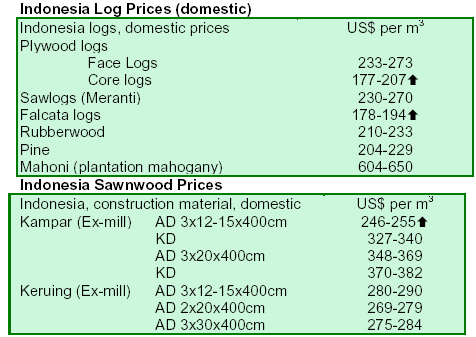
5.
MYANMAR
Demand rises for other hardwood logs
Demand and supply for teak logs remained unchanged at
the beginning of March. However, there was a strong
demand for non-teak hardwood logs. Prices in the
February tender were not as high because buyers were not
able to price and choose logs for purchase. Myanmar¡¯s
2008 furniture fair also closed on 9 March. About 38
companies participated in the event and the value of goods
contracted was estimated at USD36 million.
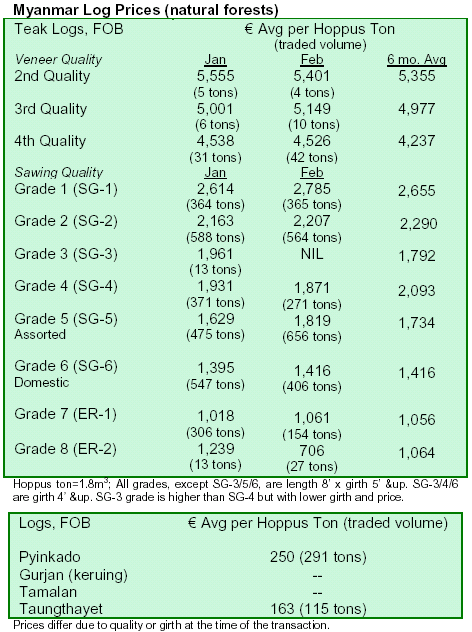
6. PAPUA
NEW GUINEA
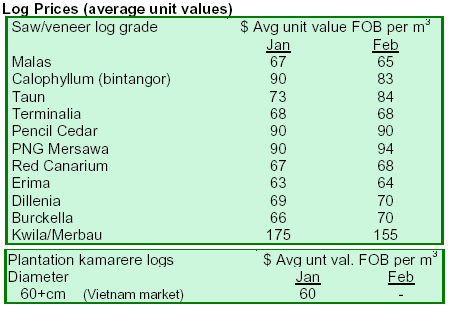
7.
BRAZIL
Brazil concludes initial bidding process for
concessions
Brazil¡¯s Ministry of Environment has announced the
selection of six companies that have been approved to
participate in the bidding process for forest concessions in
the Jamari National Forest in the Amazon. The
announcement was made in late February 2008 after initial
proposals were reviewed by the Brazilian Forest Service in
Brasilia. After analyzing the proposals by eight bidders,
the Bidding Special Committee of the Ministry approved
the following to participate in the bidding process: Amata
S.A., Civagro, Porto Junior, Sakura Madeiras, the
consortium led by Alex Madeiras and the pool of
companies represented by ZN Madeiras. Two companies
interested in bidding were not approved by the Special
Committee, as their documentation did not meet the
required criteria.
The six selected companies will now submit technical
proposals for the concessions, which will be evaluated on
the basis of bidding price, delivery of social benefits,
environmental impacts, efficiency and generation of other
local benefits. The companies will be bidding for three
areas of the Jamari National Forest. These areas are
considered appropriate for sustainable exploitation of
forest resources (wood, oils, resins, etc) in the Jamari
Management Plan by the Brazilian Institute of
Environment and Renewable Natural Resources (IBAMA)
in 2005.
The opening of the concession area was established by the
a new law on public forest management (Law 11,284/06)
after a long process of public hearings, which decided,
among other rules, that federal, state and municipal forest
areas could not be privatized. It was also decided that
these areas should be managed in three ways: established
as conservation units, designated for communal use, or
used as sustainable forest management concessions for use
up to 40 years. During such a period, the concessionaire
would be responsible for ensuring the land would be used
properly and sustainably.
Authorities step up efforts to combat deforestation in
Par¨¢
Continuing from previous reports about the growing
deforestation problems in Par¨¢ state, Ag¨ºncia de Noticias
da Amazônia recently noted federal and state efforts to
combat deforestation. Operations by over 120 inspectors
from IBAMA, the military and civil police and the Par¨¢
State Secretary of Finance and Environment have
continued confiscating illegal timber. It is believed that
much of the illegal timber coming to Par¨¢ state is from
neighboring Tailândia. Recent timber confiscations in
Tailândia have led to protests at logging sites (see TTM
13:4).
In Tucumã municipality, in the South-Center region of the
state, officials verified that no more natural forest for
harvesting existed. Only 11.6% of the original forest
remained in the area and this area had been left untouched
due to its location on hills and in flooded areas. Although
the Tucumã municipality was required by federal law to
protect 80% of forest area, the original forest area in the
municipality had largely disappeared. This was perceived
as a common situation in Par¨¢, since there was weak
control at the federal and state government levels.
Exports from Sinop cluster shrink 13% in January
S¨® Not¨ªcias reported that exports of Sinop, a major timber
cluster in Northern Mato Grosso, dropped 13.5% in
January 2008, compared to the same period in 2007.
According to the Foreign Trade Secretary of State, sales to
international markets declined from USD4.4 million in
January 2007 to USD3.8 million in January 2008. The
product with the highest drop was sawnwood (59%)
followed by tropical plywood (35%). Despite lower sales,
timber exports from Sinop represented 77% of its total
exports. A major cause of such decline was the weak US
dollar compared to the Brazilian Real.
The main importers of Sinop¡¯s timber products were
Belgium, France, the UK, Germany and Italy. Imports
dropped 33% in January 2008 compared to the same
period in 2007, falling from USD147,000 to USD97,400.
Sinop is a timber cluster that has been under continuous
federal and state inspection for illegal logging and
processing activities since 2005, when major inspections
and control operations were conducted.
Timber sector has high social impact in Mato Grosso
Di¨¢rio de Cuiab¨¢ indicated that exports of logs and
manufactured timber products had a small impact on trade,
but a large impact on the social environment in some
municipalities in the state of Mato Grosso. Timber sector
exports from this state peaked in 2007, at USD 245.9
million or 4.8% of the external trade revenue. In 2006, this
rate was smaller than in 2007 with exports worth USD
195.2 million.
Mato Grosso performed even more poorly in 2005 when
exports were worth USD 188.7 million, falling as a result
of the ¡®Curupira¡¯ operation. This was a special inspection
operation of IBAMA to catch illegal loggers and expose
illegal logging activities. In 2004, exports had reached
USD 197.7 million (FOB).
Logs, sawnwood, beams, plywood, furniture and other
timber products are exported from Mato Grosso to global
markets. China, France, the Netherlands, Thailand, the
United Kingdom, Spain, Belgium, Italy, the US and
Russia are among the main recipients. In addition to
exports of furniture, logs and manufactured timber, Mato
Grosso is also an important supplier of raw material for
the Brazilian furniture industry and for urban and rural
civil construction.
Timber exporters in Mato Grosso are concerned about the
implementation of Decree 6,321 enacted in December
2007, which prohibits deforestation in 36 municipalities in
four Amazon states. Exporting companies generally are
not supplied with raw material or other inputs exclusively
from the municipalities where they operate, as in the case
of Sinop (a major Mato Grosso timber cluster). Before the
decree, a timber company in a municipality was allowed to
purchase timber from other municipalities, promoting
inter-regional trade. However, the new decree may create
barriers to trade for regional companies and have serious
consequences on their businesses.
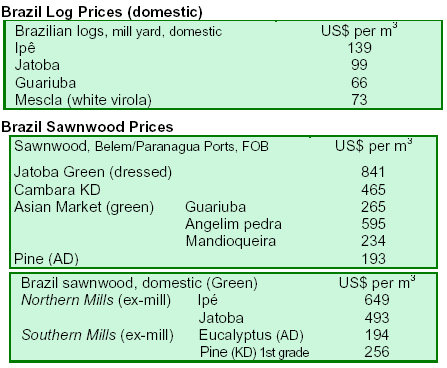
8. PERU
New law could boost Peru¡¯s reforestation activities
The Peruvian government is considering the approval of a
law to promote private investment in reforestation and
agroforestry, which could help boost zones devastated by
illegal logging. About 10 million deforested hectares
require urgent investment for their recovery. To generate
such investment, experts suggest that up to 40,000
hectares could be designated as a concession for a
maximum of 60 years, with a reversion clause should the
investor fail to develop reforestation projects. Experts
believe that in the next ten years, reforestation investment
could raise USD950 million.
Falling dollar concerns timber exporters
Due to recent drop of the U.S. dollar against the Peruvian
Nuevo Sol, exporters are wary of a forthcoming crisis
originated by the loss of international competitiveness.
Timber exporters have requested the government to
establish correction measures to protect the national
currency. Exporters have recently said some companies of
the sector have started firing workers and were discussing
closure of operations due to the loss of international
competitiveness.
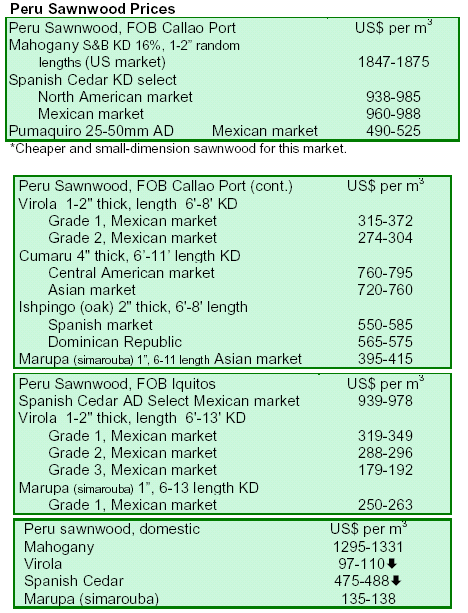
9. BOLIVIA

10. GUYANA
Guyana¡¯s FTCI continues training activities in local
communities
Guyana¡¯s Forest Training Center Incorporated (FTCI),
which was established as part of an ITTO project to
enhance training on reduced impact logging techniques in
Guyana, has so far trained 59 people since the start of
2008. The FTCI, which specialize in forest operations and
management, has also run a chainsaw milling course to
train community-based logging associations. This course,
together with outreach programmes by both FTCI and the
Guyana Forestry Commission, is part of a renewed effort
to improve the management of logging operations for the
various communities that depend on the forest for their
livelihood.
Demand surges for roundwood and shingles
Compared to 2007, February 2008 exports of roundwood
and shingles exports from Guyana delivered substantial
improvements in value. Roundwood exports rose 37% in
value and 5.9% in volume. Higher demand for posts and
poles pushed the weighted average roundwood price
upward 22.7% from USD218 to USD267 per m³. Shingles
exports also performed well, as exports to new markets in
Africa and stronger demand from the Caribbean led to a
76.4% growth in export value and a 21.4% increase in
volume. The weighted average price for shingles rose
45.3% from USD505 to USD733 per m³, due to better
prices obtained in new markets.
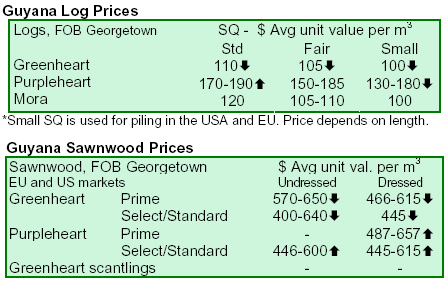
|